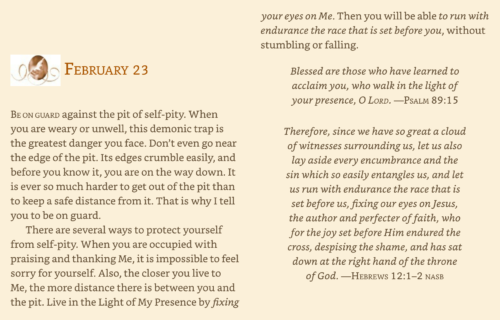An Opportunity to Grow Stronger
The more we see [and know our failures], the more by grace we shall long to be filled full of endless joy, for we are created for that.
—Julian of Norwich, Revelations of Divine Love, chapter 8
Father Richard believes that marriage and friendship are fruitful training grounds for intimacy with both God and people. He writes:
We all need experiences of being loved unconditionally. Without direct experience of unconditional love, as shared in a good marriage or close friendship, it’s hard to believe in God’s unconditional love. Our friend or partner constantly holds a mirror up to us, and shows us our good side and our bad side, and reminds us that we still haven’t really learned to love. We come face-to-face with an infinite mystery that assures us that we can’t live up to it. That’s why Jesus gave a symbolically infinite number, “seventy times seven,” to describe countless times even good people will need to forgive each other.
Thankfully, the gospel gives us a blessed assurance that we operate inside of an abundant, limitless, infinite Love. Even though we will constantly fail, failure is not the final word. We also have hope that everything can be mended, healed, and restored. A welded connection can be the strongest part of a metal bar. It’s the breaking and the welding and the mending that create the real beauty of relationship. This is the dance of intimacy: we ask one another for forgiveness as we confess that once again we didn’t do it right. We needn’t be surprised or punish ourselves for it—though we all do. Darn it, I didn’t love right again! How can I miss the point so many times?
I don’t think getting it right teaches us vulnerability. It’s when we’re wrong that we are taught to be vulnerable. We finally realize we are falling ever-deeper into something that we can never live up to—a sustained vulnerability, a continual risk. It’s not a vulnerability and intimacy that we choose just now and then. Eventually, it becomes second nature to apologize, to admit we are wrong, to ask for forgiveness but not hate ourselves for it.
Divine intimacy and human intimacy share the same dynamics. I believe one is a school for the other. Most people start with human intimacy and move toward divine intimacy. But I do believe there are a few souls who start with God’s divine ambush, who first learn how to be vulnerable before God and then transfer this to their human relationships. Two who have taught me that best are Thérèse of Lisieux and Julian of Norwich. Both are among my favorite mystics, and both are women. Women, and those in touch with their feminine side, seem to have a readiness for intimacy, mutuality, and vulnerability that offers a central message for all believers.
